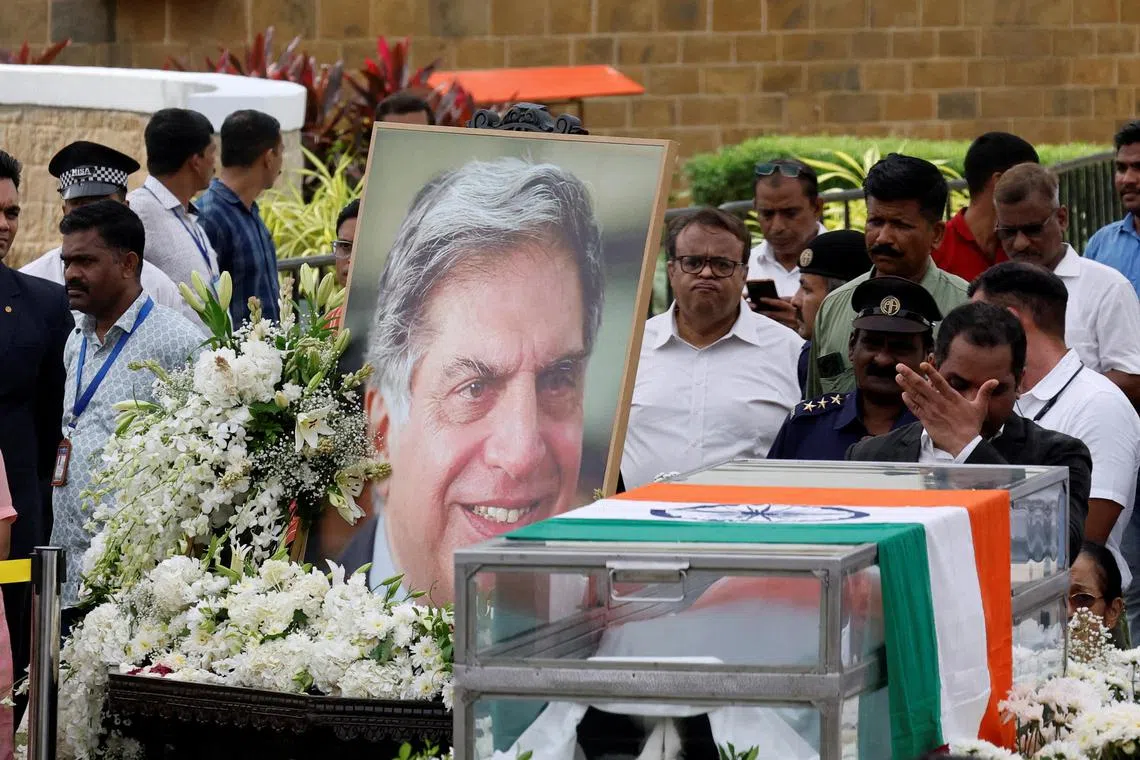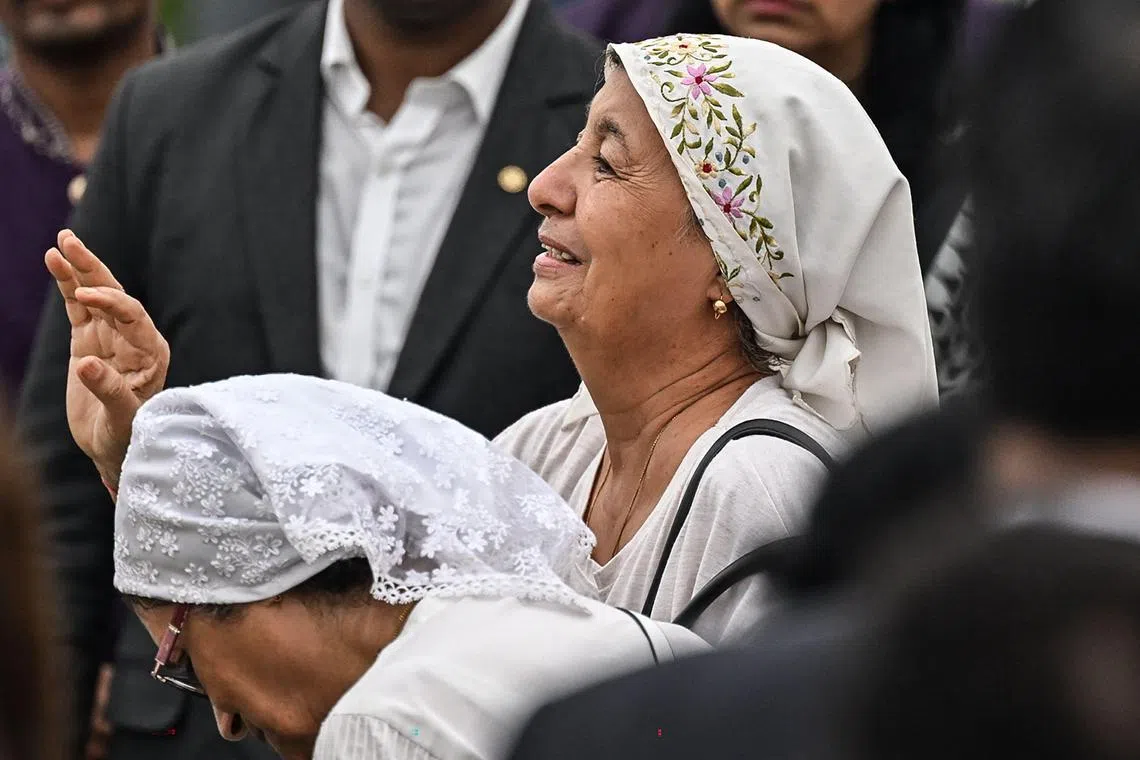Ratan Tata dies at 86: Industrialist was a beacon of India’s growth story
Sign up now: Get insights on Asia's fast-moving developments

The death at the age of 86 of Mr Ratan Tata was a moment of national grief and reflection.
PHOTO: REUTERS
Follow topic:
NEW DELHI – The 156-year-old Tata Group makes tea, soap and cars, operates luxury hotels, offers top-of-the-line software services and brought Starbucks to India.
The death at the age of 86 of Mr Ratan Tata, who fuelled the group’s expansion and remained its face as chairman emeritus, was a moment of national grief and reflection.
Mr Tata, who was the former chairman of the Tata Group, died in Mumbai on Oct 9. He had been admitted to hospital due to age-related issues on Oct 7.
Hundreds of people, from common folk to political and business leaders, along with Bollywood actors, gathered to pay their last respects to Mr Tata, whose last rites were carried out with full state honours in Mumbai on Oct 10.
The soft-spoken bachelor, who comes from the Parsi community, was widely admired for his humility and grace, and his death is seen as the end of an era of corporate leadership.
“He was the last of a generation of aristocratic businessmen who believed in the importance of ethically carried out business. This is a legacy he inherited from his forefathers,” Ms Coomi Kapoor, contributing editor of The Indian Express newspaper, told The Straits Times.
“He was a role model for many, and not just business people. Even if people occasionally cast stones at him, his reputation was strong enough to contain that.”
He took over as Tata Group chairman from his uncle J.R.D. Tata, another icon of Indian business, in 1991, just as India was liberalising and opening up its economy.
He never married and had no children.
He studied architecture and structural engineering at Cornell University in the United States, and joined Tata Industries in 1962, working for six months on the shop floor at the company’s steel plant in Jamshedpur.
With a business philosophy rooted in risk-taking, Mr Tata rode the wave of economic liberalisation, converting the Tata Group from a traditional Indian business house with multiple power centres into one consolidated conglomerate that took an early lead in new areas of growth.
Over the next 21 years, until he stepped down as the group’s chairman in 2012, Mr Tata grew the company’s revenue to US$100 billion, from US$5 billion.
In 2023-24, the group’s revenue hit US$165 billion (S$216 billion).
He consolidated within India, including by branching off into software with Tata Consultancy Services, which generated consolidated revenues of US$29.1 billion in the fiscal year that ended on March 31, 2024.
And, at a time when it was unknown for Indian companies to make international acquisitions, he took over English tea company Tetley in 2000, Anglo-Dutch steel-maker Corus in 2007, and British car brands Jaguar and Land Rover in 2008.
These acquisitions also helped herald the arrival of India, once derided for its slow economic growth, on the global stage.
“He grew the company phenomenally and... he made it international. More than 50 per cent of Tata’s business comes from overseas,” noted Ms Kapoor.

Hundreds of people, from common folk to political and business leaders, along with Bollywood actors, gathered to pay their last respects to Mr Tata.
PHOTO: AFP
Mr Tata himself noted in a 2013 interaction at the Stanford Graduate School of Business that people in the United Kingdom did not quite know what to make of an Indian company taking over storied British brands.
He said the backlash over the takeover of Tetley Tea probably “was quiet and dignified”, while Jaguar and Land Rover faced “far more emotional and far more visible” backlash.
His conviction that the acquisition would yield dividends paid off as both companies turned profitable.
“The greatest pleasure I have had is trying to do something that everybody said could not be done,” he said of his company’s automotive journey in 2015.
Still, not everything he touched turned to gold.
A passion project that did not take off was the Tata Nano, released in 2009 and marketed as the cheapest car in the world.
Mr Tata conceived the idea for the Nano after watching a family on a scooter getting drenched in the rain, and wanted to make an affordable four-wheeler.
However, he did not factor in how aspirations were rising and how people did not want to be seen in the world’s cheapest car.
Coupled with some safety concerns, production was ultimately stopped in 2019.
He stepped down in 2012 after appointing Mr Cyrus Mistry of Pallonji Mistry group, a stakeholder in Tata Sons, as his successor.
Tata Sons is the holding company of the Tata Group.
But Mr Tata reportedly did not like the direction in which Mr Mistry was taking the company, and Mr Mistry was ousted amid boardroom drama in 2016.
Mr Tata subsequently returned for a few months as the group’s head, before handing over the helm to current chairman N. Chandrasekaran in 2017.
For many, Mr Tata remained a role model in the Indian business landscape, where ethical lines are often crossed.
He noted in 2013 that he could have started an aviation business very early on, but that efforts were stymied because the group refused to pay bribes.
A longstanding aviation dream was realised when Tata Sons in 2022 acquired 100 per cent stake in Air India.
The airline was founded by Mr J.R.D. Tata as Tata Airlines in 1932 before it was taken over by the government.
“He taught us that real success isn’t just about accumulating wealth, but about using it to uplift society. His simplicity and high ideals are an inspiration for Indian entrepreneurs,” said Mr Pankaj Mohindroo, chairman of the India Cellular and Electronics Association.
“Despite his immense success and wealth, he maintained an egalitarian lifestyle, proving that true leadership is about impact, not opulence.”


